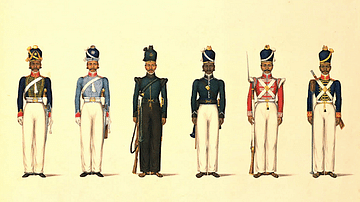Search
Did you mean: Levant?
Search Results

Definition
Peter the Great
Peter I of Russia (Peter the Great) was the Tsar of Russia from 1682-1721 and Emperor of Russia from 1721-1725. During his long reign, Peter had absolute power and brought real change to Russia, including building its first navy, introducing...

Definition
Tsar Nicholas II - Last of the Romanovs
Tsar Nicholas II (reign 1894-1917) was the last of the Romanov emperors, murdered along with his family during the turmoil of the Russian Revolution in 1917. Insisting on maintaining as far as possible the autocratic rule begun by his ancestors...

Definition
Hundred Years' War
The Hundred Years' War (1337-1453) was an intermittent conflict between England and France lasting 116 years. It began principally because King Edward III (r. 1327-1377) and Philip VI (r. 1328-1350) escalated a dispute over feudal rights...

Definition
Ancient Korea
Korea, located on a large peninsula on the eastern coast of the Asian mainland, has been inhabited since Neolithic times. The first recognisable political state was Gojoseon in the second half of the first millennium BCE. From the 1st century...

Definition
Medieval Chivalry
In medieval Europe, a code of ethics known as chivalry developed which included rules and expectations that the nobility would, at all times, behave in a certain manner. Chivalry was, in addition, a religious, moral and social code which...

Definition
Ragnar Lothbrok
Ragnar Lothbrok (Old Norse Ragnarr Loðbrók, also anglicised as Ragnar Lodbrok), whose epithet means 'Hairy-breeches' or 'Shaggy-breeches', was a legendary Viking king, with Old Norse sagas, poetry, and medieval Latin sources telling of his...

Definition
Ancient Egyptian Vizier
The vizier in ancient Egypt was the most powerful position after that of king. Known as the djat, tjat, or tjati in ancient Egyptian, a vizier was the equivalent of the modern-day prime minister of the nation who actually saw to the day-to-day...

Definition
Sengoku Period
The Sengoku Period (Sengoku Jidai, 1467-1568 CE), also known as the Warring States Period, was a turbulent and violent period of Japanese history when rival warlords or daimyo fought bitterly for control of Japan. The period falls within...

Definition
Sepoy
A sepoy was an Indian soldier in the armies of various states and European trading companies in the Indian subcontinent and then, from the second half of the 19th century, in the British Indian Army. Recruited from many different population...

Definition
Romeo and Juliet - Shakespeare's Greatest Love Story
Romeo and Juliet is a romantic tragedy written by William Shakespeare. First printed in 1597, it remains one of the most famous works of Western literature and – alongside Hamlet – is one of Shakespeare's most oft-performed plays. The play...